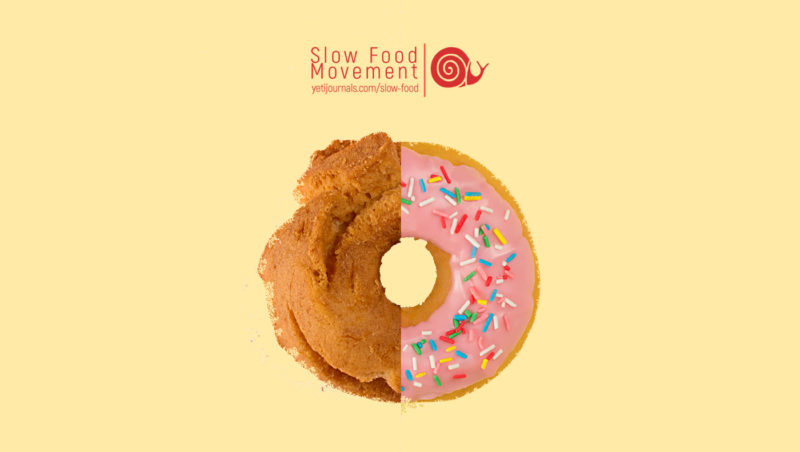We are incarcerated by a fast-paced life. We try to do everything fast in the name of being productive. And in our fast lives, while we are forced to eat fast foods which are quick and unauthentic, we are missing out on a great deal of enjoyment by not consuming what food used to be. We do not know who grows and prepares our food, or where does it come from. In short, we are just consuming things that we do not know about.
We have all had fast food. Some of the biggest brands in the fast-food industry are McDonald’s, KFC, Burger King, Pizza Hut, Subway, Starbucks, and so on. Fast food is mass-produced food, which is cheap and easy to eat. It is designed for speed of service and is meant to be produced and consumed quickly. However, it is not necessarily good for the planet or for you as it is high in sodium, saturated fat, trans fat, and cholesterol.
So, in counter-response to the rapid growth of “fast-food”, the concept of slow food was yielded. The slow food movement was found by an Italian named Carlo Petrini in 1986 as a protest against a McDonald’s outlet opening in Piazza di Spagna, in the heart of Rome. Rome is well-known globally for its great food, culture, and traditions. Petrini worried that the fast-food chains would threaten the local traditions and the local dining establishments of the working class. Thus, the slow food movement was born. The movement emphasizes to retain the world of authentic food and build respect for the people who produce, grow, and prepare it.
Slow food is just the opposite of fast food. It is all about the right time and balance. It is based on the idea of “living an unhurried life, and beginning at the table.” It encourages the use of regional and local produce, traditional cooking methods, and sharing the enjoyment of slowly prepared and cooked foods in the company of others.
It is all about ‘good, clean and fair’ food for all. Slow food is good in the sense it provides nutrition, is delicious, and promotes diversity and authentic cuisines. It is clean because it promotes food that is local, seasonal, and sustainably grown, and assists people and the environment to depend on each other. It is fair because it promotes ethical conditions and pays for producers, and accessible prices for consumers.
Now, there are a number of benefits of consuming slow food:
Nutritious:
Slow Food urges for cooking with natural, fresh, and high-quality ingredients rather than heavily processed foods. The consumers know where their food came from and that it provides high nutritional value. It helps both bodily and mental health to improve.
Slow preparation and eating:
During the preparation of the food, people take time to relax and share a conversation. While eating slowly in a relaxed setting, the digestion will be good, and we experience more flavors and aromas, thus, gaining a new appreciation for our food.
Good for the environment:
Highly processed foods require a lot of water, energy, and other resources to produce and the additional waste for packaging. In contrast, slow food urges people to choose lowly processed foods that are in season and are locally grown, which helps the environment by reducing our carbon footprint.
Promotes local food and culture:
When you go to a new place, you get to experience unique and local food cultures, often prepared with ingredients harvested locally. Slow food aims to preserve local recipes and old-fashioned food traditions as opposed to standardized and preserved food that fast food offers that does not vary with different places.
Fair for Farmers
The slow food movement also fights to protect the rights of people who harvest the food as they are an indispensable link in the food chain. It urges to provide fair and deserved wages to the farmers for their labor and is against the use of any dangerous chemicals that could harm farmers’ health. All-in-all, we all need to adopt a slow food culture and attitude because it is good, clean, and fair. Be healthy, eat slow!

Hey, I am Khusbu. And I write about the themes that I am passionate about or just random topics that spark my interest. Here, I try to express my learnings and my experiences. By writing, I aspire to learn and voice my thoughts. And I hope that by reading, you will learn a thing or two too.

